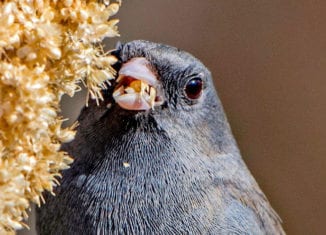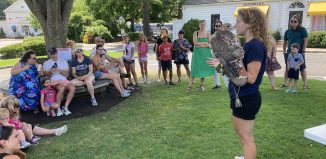Encourage birds to make your garden their home

By Ellen Barcel
I love to see birds in my garden. Besides the beautiful calls and songs you hear, they provide a benefit in that many enjoy munching on the insects that threaten my plants. So, the question becomes, how do you encourage birds to make your garden their home?
One way, of course, is to make sure you have a birdbath, a source of water for them to drink and bathe in. Remember to change the water frequently so as not to encourage mosquitoes to breed there. Another way is to have one or more birdhouses for them to nest in. You can also have food available in a bird feeder. Or you can put in plants that will produce lots of seeds for the birds to enjoy, especially as the weather cools in the fall. So, here are some suggestions.
Corn
Many, many years ago, as a novice suburbanite, around Halloween, I saw a bunch of brightly colored Indian corn cobs in the supermarket and bought it as a decoration for my front door. I kept hearing strange noises, sort of like thumps. Each time, I’d go to the door and no one was there. This went on for a number of days, until I noticed that most of the kernels from the ears of corn were gone. It was then that I realized that the local birds were appreciating what I thought of as a decoration and what they thought of as dinner. So, yes, birds love corn. So, if you have the room, plant a small patch of corn. What you don’t eat, the birds will.
Millet
Millet (foxtail millet) grows easily and, yes, the birds love it. Millet is a grass that was domesticated in the Old World. I’ve read that grains of it were even found in the tombs with pharaohs in ancient Egypt. Experts say to harvest it when the seed heads turn a golden brown, or, leave the seeds alone and let the birds do it for you.
Sunflowers
Sunflowers are absolutely beautiful in the garden. They’ll easily reach five or six feet, making a lovely and tall wall of flowers. Yes, of course, harvest some of the flowers and enjoy the seeds yourself, but what you don’t want, leave on the plant. They will dry and soon the local birds will be enjoying them. When all the seeds are gone, compost the rest of the plant. And, yes, save some of the seeds from this year’s crop for next year’s garden.
Pumpkins
Large birds and small mammals (squirrels, for example) enjoy pumpkins. Pumpkins grow easily here but have a fairly long growing season — up to 125 days to maturity. It’s best to plant the seeds directly in the garden, but, if you want an early start, plant them in peat pots, which can be moved whole into the garden once it warms up. Plant them in full sun. Interestingly, the seeds themselves can overwinter outside. I’ve seen several locations where a pumpkin left outdoors during the cold months, led to pumpkin seeds germinating the following spring. Collect the seeds in autumn and dry them before putting them out for the birds or saving them for next year’s crop. If you don’t plan on eating the pumpkins (as, for example, in pumpkin pie), choose one of the unusual pumpkins, like the miniature ones (‘Baby Boo’), blue pumpkins (‘Blue Lakota’) or white (‘White Cloud’). There are even warty ones, such as ‘Red Warty Thing.’ Any of these make unique decorations.
Perennial flowers
While all of the above need to be replanted each year, there are many perennials that birds absolutely love as well. These are part of the “plant once, enjoy for many years” school of gardening and include black-eyed Susans, blanket flowers, cone flowers, asters and mums. Note that most of these bloom in mid to late summer and into the fall. I’m always just about ready to give up on my asters when suddenly, in the cold autumn days, the purple flowers appear. Leave the flowers on the plants in autumn until the birds have enjoyed all of the seeds. Don’t cut them back until the leaves have gone brown and there are no more seed heads on the plants.
Ellen Barcel is a freelance writer and master gardener. Send your gardening questions to [email protected]. To reach Cornell Cooperative Extension and its Master Gardener program, call 631-727-7850.






